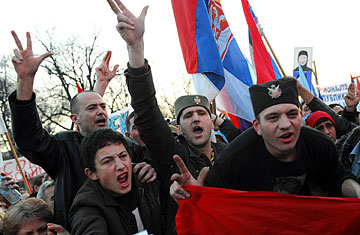By Laia Rodríguez Budí

If you search for “Serbs” over Google Images, this is one of the first pictures you will get. Extracted from the article by Andrew Purvis entitled “Serbs Rage at U.S. Over Kosovo” on Times (Thursday, Feb. 21, 2008). http://content.time.com/time/world/article/0,8599,1715206,00.html
I will start this article with a personal story. When I met my current boyfriend (a Serb from Pancevo), most people whom I told about him were shocked. Then, the conversations used to follow this path: “A Serb? How can you be in a relationship with one of them? Serbs are those who massacred thousands of Bosnians during the war!”
Departing from this experience I would like to create my argument. Usually, the national identifications are constructions based on widely spread stereotypes. For instance, the Spanish people are known to be lazy, while the Germans, hard-working. But, in the case of former Yugoslav identities’ external perceptions, these have been hardly shaped not only by stereotypes but also by the idiosyncrasies, the outcomes and the mediatic impressions from the Yugoslav Wars of Secession.
We could talk about all former Yugoslav identities and their construction for hours (even for days and weeks); but the aim of this post is, as the title introduces, to tackle specifically the social construction of the Serbian identity and its foreign conception.
Firstly, how is Serbianhood regarded from inside, at the glance of Serbs by themselves? From my own experience, talking and above all, listening to them, I strongly affirm that Serbs create a proud and patriotic nation. Serbs are proud of their far past (especially regarding Medieval Ages and their Kingdom that once was one of the most powerful in Eastern Europe). Opinions tend to diverge concerning recent years, as the Broz times and, particularly, the Wars of the 90s. Furthermore, Serbs regard themselves as a strong, brave and fierce nation which does not allow anyone to ride roughshod over them.
Until this point, nothing appears to be negative. A lot of peoples of the world like to claim themselves as patriotic and tenacious. The key factor here is that this features of the Serbianhood regarded by the own folks, as we stated before, combined with the characteristics and events that took place during the 3rd Balkan War form the explosive foreign conception of Serbs as a demoniac nation.
Actually, it is a fact that the most horrible massacres, sieges, rapes, tortures and other crimes against humanity were committed by the Serb radical factions. And what is the most important: they were committed in the name of the country. The aforesaid savage actions had their roots in a radical nationalist right-winged ideology.
The stunning actions that emerge from hate tend to remain engraved in the minds of the witnesses, since the first-hand victims until the mere TV audience. Hence, the following 2 concepts: “Serbia” and “radicalism” entangle. That explains why most people around the world’s first thought when they hear about Serbia conducts them to the war and atrocities.
Besides, it is important to remark that this correlation between a nation or a culture and extremism has not only affected the former Yugoslav republics. By way of example, nowadays, the totality of the Muslim diaspora populations in the West suffer from discrimination and sometimes even from violence since they have been labelled as “violent and close-minded”. Actually, this fact looks contradictory and grotesque: can someone be more close-minded rather than someone who is unable to understand different ways of thinking and who is carried along by prejudices and hate?
Coming back to the Serbs and to sum up, due to the barbaric actions of a few, the whole of the Serbian nation has been labelled as violent, intolerant and even genocidal group of people. This conception must change and possibly will in a recent future. Serbia is committing itself to European integration; consequently, this state as a European Union member will likely earn a different kind of reputation, definitely more positive than the one which has been heavily carrying for decades.